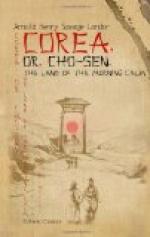The crops are generally gathered in August, and the dead stalk is used for fuel, while the ashes make fairly good manure. The quantity of clean cotton is about 85 lbs. per acre, and of seed-cotton 345 lbs. per acre.
But to return to my narrative, luncheon-time came in due course, and as I was spreading out my napkin on my knees, I reminded the person who had whispered those mysterious words in my ear, of the promise he had made.
“Yes,” said he, as he cautiously looked round, “I will tell you his story. Mind you,” he added, “this man to whom you spoke a while ago was only one of several, and he was not the principal actor in that outrageous business, still he himself is said to have taken a considerable part in the criminal dealings. Remember that the account I am going to give you of the affair is only drawn in bold lines, for the details of the expedition have never been fully known to any one. For all I know, this man may even be perfectly innocent of all that is alleged against him.”
“Go on; do not make any more apologies, and begin your story,” I remarked, as my curiosity was considerably roused.
“Very good. It was on April 30th, 1867, that an expedition left Shanghai bound for Corea. The aims of that expedition seemed rather obscure to many of the foreign residents at the port of departure, as little faith was reposed in the commander. Still, it must be said for its members that until they departed they played their role well. Corea was then practically a closed country; wherefore a certain amount of curiosity was displayed at Shanghai when three or four Coreans, dressed up in their quaint costumes and transparent horse-hair hats, were seen walking about, and being introduced here and there by a French bishop called Ridel. A few days later the curiosity of the foreign residents grew in intensity when the news spread that an American subject, a certain Jenkins, formerly interpreter at the U.S. Consulate, had, at his own expense, chartered a ship and hurriedly fitted out an expedition, taking under his command eight other Europeans, all of a more or less dubious character, and a suite of about 150 Chinamen and Manillamen, the riff-raff of the Treaty Port, who were to be the crew and military escort of the expedition. A man called Oppert, a North German Jew, and believed by everybody to be an adventurer under the guise of a trader, was in command of the ’fleet’—which was composed of a steamer, if I remember right, of about 700 tons, called the China, and a smaller tender of little over 50 tons, called the Greta. Oppert flew the flag of his own country, and in due course gave the order to start.”
“Well, so far so good,” I interrupted; “but you have not told me what connection there was between Bishop Ridel’s four Coreans and your body-snatching friends?”




